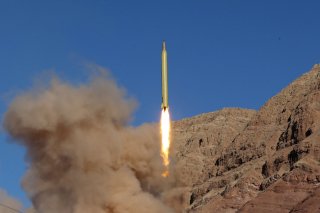It’s All About Commitment: How to Secure a Nuclear Deal with Iran
Successfully re-entering the nuclear agreement will require a strategic approach that accounts for American politics, regional constraints, and Iran’s domestic situation
For the past year, the Biden administration has attempted to renegotiate a new Iran nuclear deal, a multilateral agreement between the United States, Iran, and other partner states to prevent Tehran from building a nuclear weapon in exchange for sanctions relief. Given that nearly 76 percent of the American public believes a nuclear Iran would be a critical threat, re-entry into this deal is vital for regional stability and preferable to the risk of threat escalation due to public fears.
A nuclear Iran is unlikely to threaten U.S. national security due to the fact that the country is geographically distant and the United States has a far more powerful nuclear deterrent. Nevertheless, it could still heighten tensions in the Middle East and raise the prospect of miscalculation and preemptive aggression. Countries, such as Saudi Arabia, may seek nuclear weapons to have a deterrent of their own. The previous deal successfully required Tehran to remove most of its centrifuges and uranium gas. However, the Trump administration’s 2018 withdrawal and subsequent “maximum pressure” campaign further escalated tensions, culminating in attacks on American soldiers. At a time when U.S. foreign policy is bogged down with a crisis in Ukraine and global threats such as climate change, the last thing Washington needs is pressure from domestic constituencies to dedicate more resources to the Middle East. Diplomatic engagement to reach compromise is far less costly than risking brinkmanship in a future administration.
Washington should offer the institutional and policy commitments needed to incentivize Iran into joining a renewed deal, which can be done by addressing U.S. domestic pressures, negotiating within reason, and developing mutual understanding. Addressing these underlying issues means making credible commitments that cannot be undermined by domestic politics, unilaterally removing the most egregious sanctions to improve bargaining, and developing trust to better understand and communicate resolve.
Countries refuse to cooperate when their negotiating partners pose a threat and lack credibility. Unfortunately, domestic politics causes Washington to be perceived as both. The administration’s efforts at negotiation are undermined by the aggressive intentions of Congress. Any deal made by the administration amounts to a gentleman’s agreement; to be scrapped just as it was in 2018. Without credible commitments to stop a hostile Congress or future administration from undermining the efforts, Iran has no reason to believe any agreement will be honored.
In addition, the continued presence of sanctions makes it harder to reach a deal. Coercion during negotiations can inadvertently be a roadblock to resolution. By increasing costs of continued hostility, sanctions create mixed signals about an opponent’s willingness to reach a settlement by widening the minimum required for an agreement.
Finally, the administration needs a better understanding of Iranian resolve to maintain the ultimate deal. Iranian resolve is undoubtedly higher than it was during the original negotiations: the election of hardliner President Ebrahim Raisi is proof of that. A dynamic understanding will be critical in enforcing the deal and determining what is not working going forward.
To solve these issues, President Joe Biden needs a strategic approach to the negotiations that accounts for American politics, regional constraints, and Iran’s domestic situation.
To address domestic political constraints, the Biden administration should make the agreement harder to leave. Trade and economic integration can help facilitate this process by making both parties a stakeholder for peace. Washington should encourage business interests to invest in Iran, develop interdependence, and create a strong domestic constituency for ensuring compliance to the deal. Iran’s rapid advances in science and technology as well as a highly educated population make it a lucrative investment for the U.S. tech industry. By building Iranian-American ties, Washington can give Tehran the credibility it needs to believe the deal is worthwhile.
In addition, the Biden administration should widen the negotiation space by immediately removing the sanctions applied after the Trump administration left the original deal. These sanctions were applied during a period of renewed negotiation, thus fueling miscommunication making it harder to reach an agreement. Sanctions that indirectly affect food and medicine should be removed right away since they inflame hostilities with no benefit to American security.
Finally, the Biden administration needs to better understand the Iran’s government and society. They should develop a fast-track student visa process for Iranian students to study in the United States. Over time, Washington can further these ties by normalizing relations and opening diplomatic exchanges by the end of the first term.
While the United States’ own nuclear deterrent can protect its people from imminent threats, failure to reach a deal will increase the odds of a nuclear Iran. Given the U.S. domestic political environment, this means more wasted U.S. resources, new headaches, and additional distractions. The administration should remove some sanctions to bargain and secure a deal which opens the path to a long-lasting engagement.
Yameen Huq is a cybersecurity professional and Strategic Leaders Fellow at the John Quincy Adams Society. Previously, he was a consultant specializing in analytics, cybersecurity, and strategy for public and private-sector clients. He holds a Master's in Cybersecurity with a focus on technology policy. His previous writing has appeared in The National Interest, American Affairs, and Exponents. The opinions expressed in this post are his own and do not reflect on those of his employer. Follow him on Twitter here.
Image: Reuters

